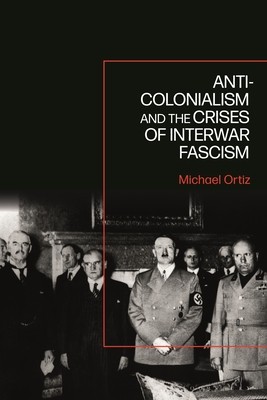
- We will send in 10–14 business days.
- Author: Michael Ortiz
- Publisher: Bloomsbury Publishing PLC
- ISBN-10: 1350334928
- ISBN-13: 9781350334922
- Format: 15.6 x 23.4 x 1.6 cm, kieti viršeliai
- Language: English
- SAVE -10% with code: EXTRA
Anti-Colonialism and the Crises of Interwar Fascism (e-book) (used book) | bookbook.eu
Reviews
Description
What is fascism? Is it an anomaly in the history of modern Europe? Or its culmination?
In Anti-Colonialism and the Crises of Interwar Fascism, Michael Ortiz makes the case that fascism should be understood, in part, as an imperial phenomenon. He contends that the Age of Appeasement (1935-1939) was not a titanic clash between rival socio-political systems (fascism and democracy), but rather an imperial contest between satisfied and unsatisfied empires. Historians have long debated the extent to which Western imperialisms served as ideological and intellectual precursors to European fascisms. To date, this scholarship has largely employed an "inside-out" methodology that examines the imperial discourses that pushed fascist regimes outward, into Africa, Asia, and the Americas. While effective, such approaches tend to ignore the ways in which these places and their inhabitants understood European fascisms. Addressing this imbalance, Anti-Colonialism adopts an "outside-in" approach that analyses fascist expansion from the perspective of Indian anti-colonialists such as Jawaharlal Nehru, Subhas Bose, and Mohandas Gandhi. Seen from India, the crises of Interwar fascism-the Second Italo-Ethiopian War, Spanish Civil War, Second Sino-Japanese War, Munich Agreement, and the outbreak of the Second World War-were yet another eruption of imperial expansion analogous (although not identical) to the Scramble for Africa and the Treaty of Versailles. Whether fascist, democratic, or imperialist, Europe's great powers collectively negotiated the fate of smaller nations.EXTRA 10 % discount with code: EXTRA
The promotion ends in 22d.09:00:12
The discount code is valid when purchasing from 10 €. Discounts do not stack.
- Author: Michael Ortiz
- Publisher: Bloomsbury Publishing PLC
- ISBN-10: 1350334928
- ISBN-13: 9781350334922
- Format: 15.6 x 23.4 x 1.6 cm, kieti viršeliai
- Language: English English
What is fascism? Is it an anomaly in the history of modern Europe? Or its culmination?
In Anti-Colonialism and the Crises of Interwar Fascism, Michael Ortiz makes the case that fascism should be understood, in part, as an imperial phenomenon. He contends that the Age of Appeasement (1935-1939) was not a titanic clash between rival socio-political systems (fascism and democracy), but rather an imperial contest between satisfied and unsatisfied empires. Historians have long debated the extent to which Western imperialisms served as ideological and intellectual precursors to European fascisms. To date, this scholarship has largely employed an "inside-out" methodology that examines the imperial discourses that pushed fascist regimes outward, into Africa, Asia, and the Americas. While effective, such approaches tend to ignore the ways in which these places and their inhabitants understood European fascisms. Addressing this imbalance, Anti-Colonialism adopts an "outside-in" approach that analyses fascist expansion from the perspective of Indian anti-colonialists such as Jawaharlal Nehru, Subhas Bose, and Mohandas Gandhi. Seen from India, the crises of Interwar fascism-the Second Italo-Ethiopian War, Spanish Civil War, Second Sino-Japanese War, Munich Agreement, and the outbreak of the Second World War-were yet another eruption of imperial expansion analogous (although not identical) to the Scramble for Africa and the Treaty of Versailles. Whether fascist, democratic, or imperialist, Europe's great powers collectively negotiated the fate of smaller nations.

Reviews